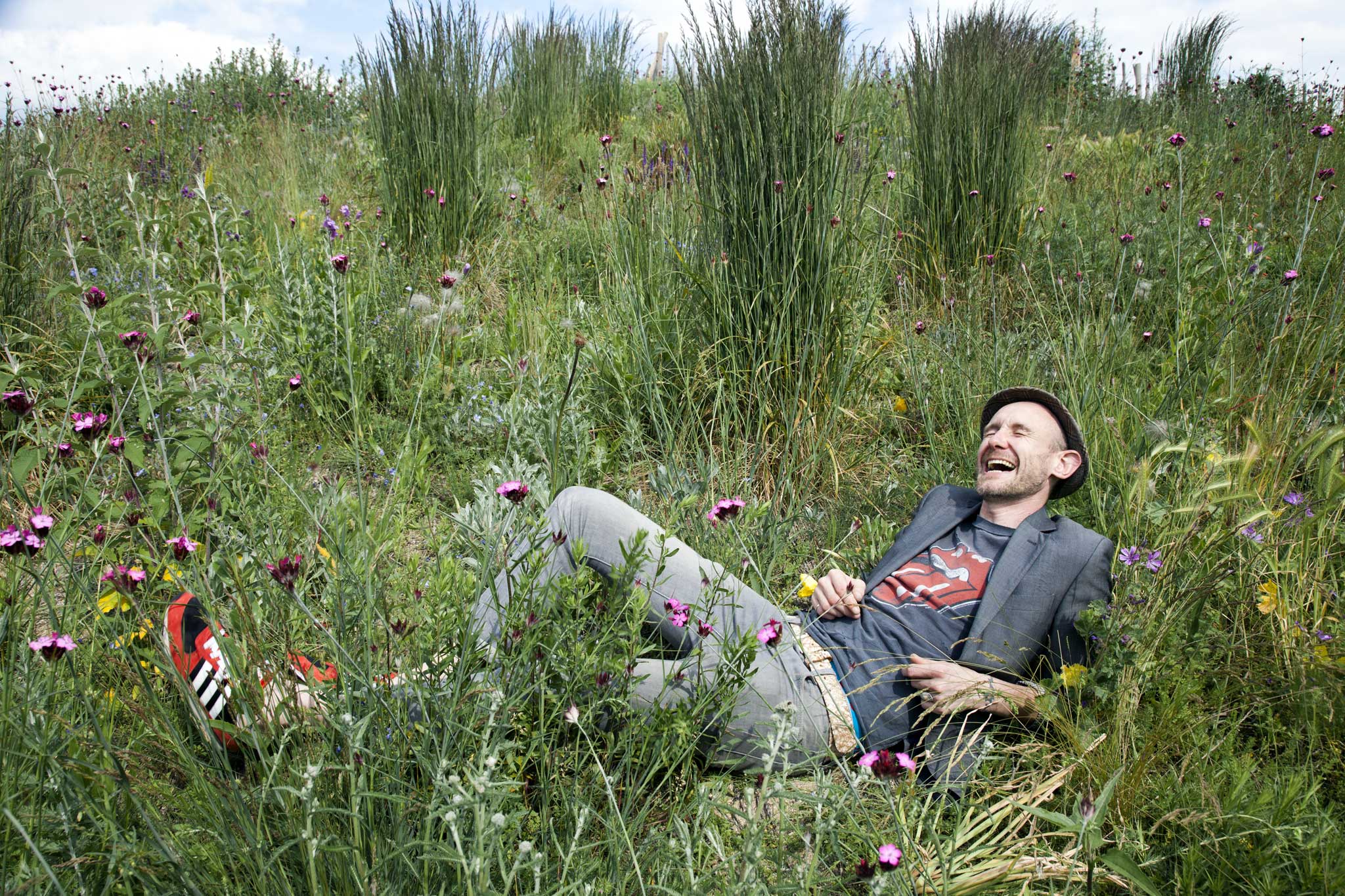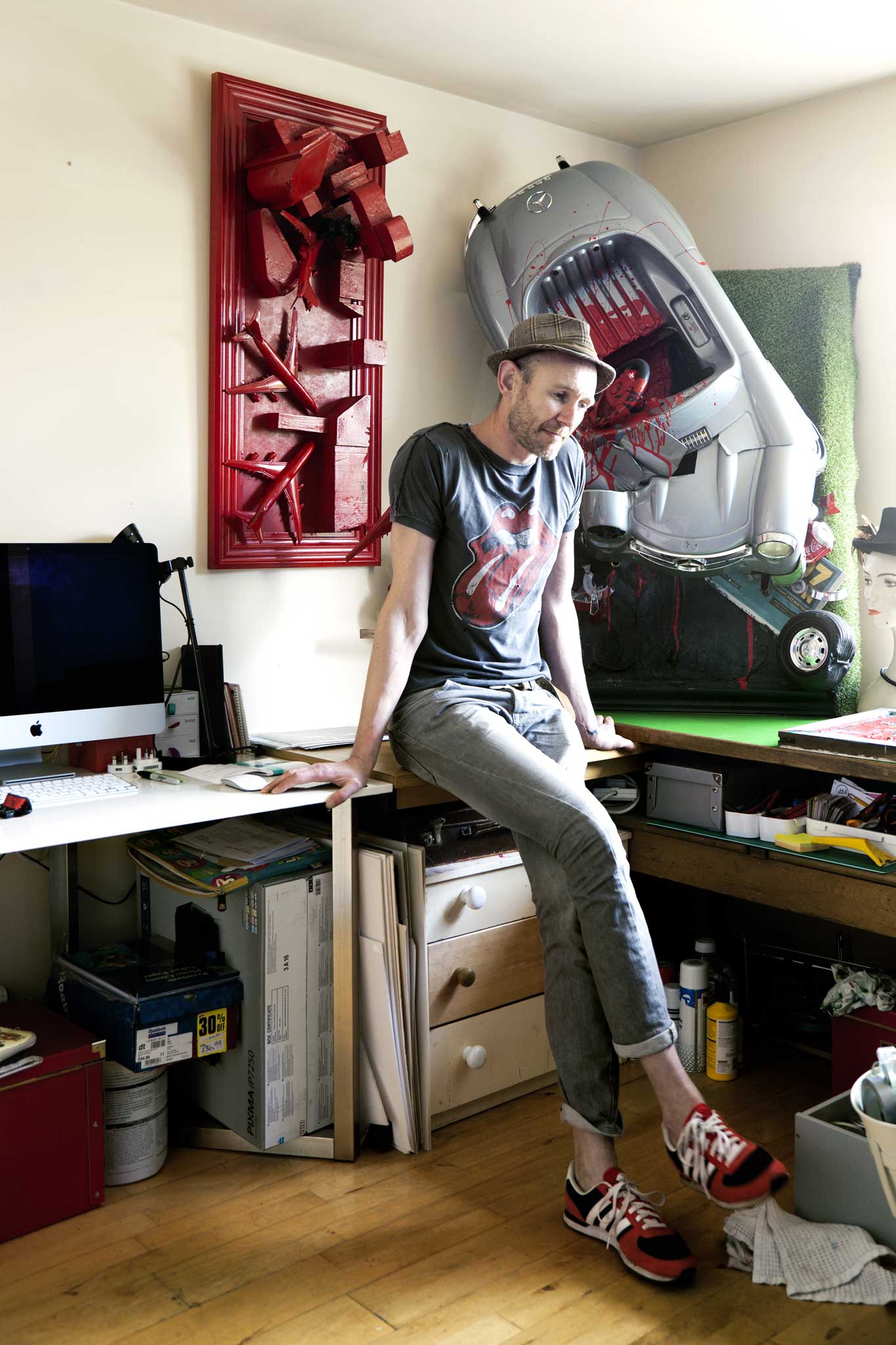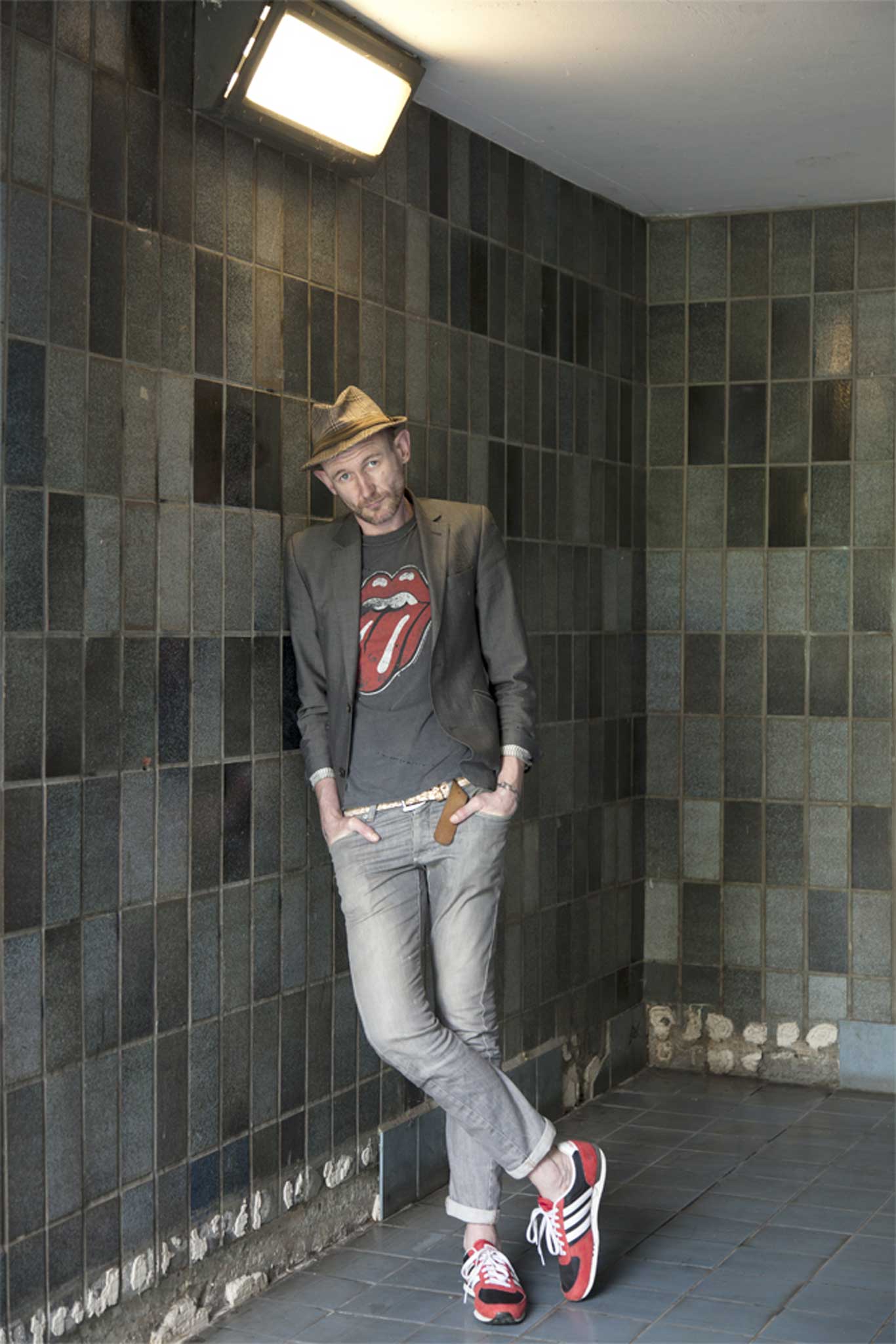David Tovey has weathered cancer, cardiac arrest, HIV and homelessness - and he's only 39
Tovey went from cooking for the Queen to rifling through bins for his supper. His is a startling story of endurance against the odds – and of a social safety net failing at every turn

It's 20 June, 2013. A 38-year-old man, distressed, emaciated, depleted from chemotherapy, dishevelled from sleeping rough, walks out of Islington council offices on Upper Street, north London, and pulls out a syringe. It contains two grams of crystal methamphetamine – enough to kill him. He finds a vein and slides the needle in. Moments later, pool attendants from the nearby leisure centre see the man collapse on the street. They rush out, and, in the half-breath between life and nothing, reach him, resuscitate him, and phone for help.
"I remember being in tears – there's only so many times you can hear people say, 'We can't help you, we can't help you, we can't help you'. I remember hearing voices, too, as if they were really close but they were not, and then hitting a lamppost. The next thing I knew I woke up in the ambulance."
The man's name is David Tovey. In a little more than two years, his life had slid – from a successful chef who had cooked for the Queen while in the Army, to eating out of bins. Serving our country to being abandoned by it. How does a young, talented, hard-worker, one of David Cameron's "doers and grafters", become homeless and suicidal? Why was there no help for him? What happened in Britain in those two years?
I go to see David at the homeless shelter in which he is now housed. A large, drab slab looms ahead on a main road in Camberwell, south London; the kind of scuffed, soulless box that 1960s architects excelled at. Former servicemen mostly populate this one. A St George's flag billows from a windowsill. Help for the vulnerable might have been scaled back, but national pride persists here. A love, it seems, unrequited.
He greets me with a hug and shows me up to his room: eight-feet across, with a tiny adjoining galley – the kitchen. The fridge is next to the bed. Artwork from his recent degree course (more of which later) assumes proud prominence: portraits fashioned from newspaper print and papier maché; an abstract drawing; and a sculpture comprised of a huge (found) toy Mercedes, bent at the driver's seat – a right-off – with red paint splattered across the dashboard.
"We all crash, don't we?" he says.
We find an office downstairs to chat. Over the next few hours, the story floods out with barely a breath. He has never told anyone everything before. It is a tale about safety nets, about who has to step in when they're removed, and how policy – theoretical, ideological – dreamt up in Westminster offices invades the lives – real, actual – of those in need.
David's story begins on Easter Sunday, 2011. For two decades, he had been a "workaholic", notching up 80 to 100-hour weeks, first in the Army – at Sandhurst, before being posted all round the world – then as head chef at a succession of upscale restaurants and gastropubs. It was all he knew after a childhood in Kent with two chefs as parents. But on that Sunday, everything changed. David had just arrived at work when he started to feel unwell.
"I knew something wasn't right, I was losing feeling down my left side and then my speech started going really slurred." He'd had a stroke, aged 36. He phoned 999, a passing ambulance arrived within two minutes, took him to hospital, and, thanks to the speedy response, he made what seemed like an equally speedy recovery. Just one week later, he went back to work. "I had a business to run."
But he was convinced it was going to happen again. He couldn't concentrate. "It knocked my sense of safety." Worried he couldn't cope, physically or mentally, with the relentlessness of kitchen life, and after a few weeks of trying, he walked away. The ensuing financial fall-out put a strain on his relationship, triggering rows and so, when his partner was offered work in Cardiff that October, they broke up.
"That's when I was diagnosed with neurosyphilis," he says, unaware of how he caught it. Neurosyphilis occurs when the bacteria that causes syphilis enters the spinal cord and brain, sparking an aurora of psychiatric and neurological symptoms including depression, confusion, and seizures. It usually takes at least a decade for untreated syphilis to develop into this, unless you have another condition – and it would be another few months before David discovered that.

Around the time of the break-up, he started becoming forgetful.
"I accidentally set alight to the kitchen," he says, laughing. He laughs frequently, a pressure valve releasing every few sentences. His GP sent him for "a full MOT" at the hospital, where, after a lumber puncture, and a series of blood tests, he was admitted for treatment.
Four days later, the bleeding he had also been experiencing was explained, thanks to a colonoscopy: he had colon cancer. They removed the tumour but weeks of chemotherapy followed with daily intramuscular injections of procaine penicillin for the syphilis. At high doses, the latter can cause seizures and disruptions to the central nervous system.
"Two weeks in, on 15 December 2011, the nurse gave me the first injection in my buttock and all I remember is a really strong taste of metal in my mouth, and then everything started going echoey. I could hear shouting and it all went black."
He'd had a cardiac arrest.
"The next thing I remember was coming to with 10 or so people in the room who then started dragging me out on a trolley and going outside towards another hospital. It was pissing down with rain and they had brollies over me, a defibrillator on me, a needle sticking out of my chest and I was petrified, crying my eyes out."
But by February 2012, with the treatment over, his hair growing back and his strength returning, David decided to go back to work, to give it another go as a chef – he'd never been out of work before.
After a couple of months as a head chef, he started losing weight – "about a stone" – throwing up, having fevers, and, most alarming for someone with a conspicuously perky demeanour, suffering from depression. He'd never before experienced mental health problems. In the space of a week, beset by confusion, blackouts and even blacker moods, he took five overdoses.
"I didn't even know what I was doing, or what was happening," he says. "I just took whatever pills I could find. One time, a member of the public found me, another three times I admitted myself to hospital, and then the last time my flatmate found me. After that, I phoned my doctor and said, 'Something isn't right, this isn't me'."
The hospital sent David for a brain scan, just as his former hospital in Croydon phoned about a set of blood tests previously conducted. They told him he was HIV-positive. Again, he did not know how he'd contracted it ("I'd had checks; I'd never cheated on anyone"), but it explained the weight loss, the fevers, the sped-up progression of syphilis and even the depression, which can affect some sufferers.
"I was relieved, actually, because I'd been given an answer as to why I'd been feeling so bad. In a way, I was lucky," he says.
With renewed hope, but aware that he needed desperately to retrain in order to find a career he could manage, David enrolled on a foundation art course at London Metropolitan University. He loved it.
"The teachers liked me, I was making new friends, life was sweet," he says, grinning ear-to-ear, tugging at his V-neck T-shirt. Through its low neck, it is clear how underweight David still is. His collarbone protrudes, his long arms are sinewy, his cheeks hollow.
At the time, living with a friend in a rented flat near his university, and trying to live without an income, there wasn't much money for taking care of himself nutritionally. He'd already faced the £6,500 tuition fees that year, the first Coalition policy to hit him badly.
"The rent was only £480 per month," he says – a modest amount in London. "But I couldn't get enough work to cover it and all my other expenses. I even went back to my old restaurant and worked as a kitchen porter for a few weeks – that's how desperate I was." The two years leading up to this had seen the highest unemployment rates since the recession of the early Nineties.
"I was really worried that we would get kicked out the flat, so I kept going to the council saying I needed help, and needed housing benefit, and they kept saying, 'We can't help you because you're a student'." Margaret Thatcher's government stopped students from claiming housing benefit, apart from the most vulnerable, but despite everything, David still didn't qualify. And because of a previous bankruptcy, he couldn't get credit or loans.

Instead, he applied for PIP – the new Personal Independence Payment brought in on 8 April, 2013 to replace the Disability Living Allowance (DLA). PIP was designed to focus on how claimants' health problems affect their ability to work, rather than what the health problems are, so the Department for Work and Pensions outsourced Atos, the French multinational IT firm, to assess applicants. David waited and waited for his assessment, but nothing happened. His was far from an isolated case.
In March this year, the Work and Pensions Select Committee published a report into the delays. Its chair, Dame Anne Begg MP, revealed: "By the end of last year decisions had been made in fewer than 20 per cent of new claims submitted since April 2013".
David became increasingly desperate and terrified of losing his home. "I couldn't see a way out. I'd gone to see the council again, and they'd said they couldn't help. I remember being hysterical, in tears. People wouldn't understand unless they've been there and had the door slammed in their face by somebody who was supposed to help. So I thought, 'I give up'. That's when I took the crystal meth overdose outside the council offices." After coming out of hospital, his family back in Kent invited him to stay. >
"It was the hardest thing ever – whatever I did they were watching, making sure I didn't try to kill myself again. They were doing it because they loved me, but they can't afford to support me and I couldn't afford to commute to university from Kent every day. I stayed for a month and when I got back to my flat the locks had been changed. All my stuff was still inside."
His mother went to Lidl and bought David packets of noodles and tins of food. He loaded them into his car with a camping stove. This became his new home.
"I thought, 'I've been in the Army, I can do this'. I had mentally shut myself off from everything that was going on." Why didn't he ask friends for help?
"I was ashamed," he says, looking away. "I've never been able to ask for money. My mum brought me up with the idea that you support yourself, and being in the Army is all about self-sufficiency. In the Army catering corp, our motto was 'We sustain'. And that's what I did."
He told no one about his situation. He would sleep in the front as there was more room there – crucial when you're 6'3". At night, passers-by would bang on the windows and shout abuse. But he kept going to lectures and classes. "I had my uni writing to the council saying I needed to be housed, my HIV clinic did too, but nothing was being done." According to Government figures, between 2010 and 2013, the number of rough sleepers in England rose by 37 per cent.
The cancer came back, and so, while still sleeping in his car, David again attended weekly chemotherapy sessions. It was harder this time, he threw up more, perhaps not surprising given that he was picking food out of dustbins. One night, during a storm in October 2013, a tree missed his car by inches. It was the final straw. He resolved this time to end his life. He went to Isledon Gardens, a tiny park near Arsenal. It was dark and freezing cold, and he once again took out a needle containing crystal meth.
"But a park attendant saw me, leapt over, and snatched it out of my hand... He sat there talking to me, he wanted to know my story, he actually cared. I owe that guy my life." David's eyes fill. He takes a moment to breathe. The attendant phoned a homeless charity called the Pillion Trust, who put David up the following night.
"They were amazing," he says, getting upset again. "I broke down in front of them, I felt like a two-year-old child. If it weren't for them and the park attendant I wouldn't be here today."
The Pillion Trust had their grant axed by Islington Council earlier this year, as part of the cuts. Had it not been for winning funding elsewhere, the trust would have closed this summer. They still only have enough to last until the end of the year.
Without the PIP, and without housing benefit, David had no choice but to pull out of his course in December.
"I was gutted," he says, looking defeated. "The whole point of going was to retrain because I couldn't do the job I'd been doing and I didn't want to be on benefits."
He was told he would still have to repay the whole of this year's £6,500 fees, despite dropping out after just four months – but not until 2016 when he was earning above a certain level. But the week before we meet, he received a letter saying he had to pay the full amount now.
The stress, and the months spent sleeping in his car, have blighted his health. Because of the HIV, his CD4 count – the chief measure of the immune system – plummeted to 180. Doctors used to call anything below 200, Aids. And because he was sleeping rough, the HIV clinic couldn't give him the daily medication that would repair his immune system.
He now lives solely on Employment and Support Allowance (ESA), which for him works out at £108 per week. After he's paid bills he has "between £7 and £25 a week to live on". If it weren't for weekly deliveries from FareShare – food parcels sent in to the shelter – he would not survive, he says.
Because of changes and cuts to council tax benefit, also brought in by the Coalition last April, he has to pay £10 a month in council tax – a huge proportion of what he has to live on.
What, I wonder, of everything he's endured, has been the hardest? I expect him to pinpoint the heart attack, or the cancer, or sleeping rough.
"Doing it all alone," he says, trying to disguise the sadness in his voice. "Any illness I can deal with. But feeling so alone, feeling like there was no one to help me... I know part of that was my fault, because I didn't always ask for help as I was ashamed, but when I did I was knocked back and so you think, 'Is everyone going to say no?'."
His health, at least, seems to be improving.
"If I had another phone call saying my cancer had come back I'd be in the loony bin in a few weeks. I don't think, mentally, I can take any more. But I don't want to be on benefits. I want to get back into society and make a success of my life. I want to show that whatever you go through you can overcome, that for other people out there going through what I did, there is hope."
He hugs me again and shows me out, asking me to stay in touch. I text him a couple of weeks later to see how he's doing.
"I'm doing really good, working on some new artworks, although they found a lump on my lung," he replies. "But I'm staying positive about it." David is still awaiting his Personal Independence Payment assessment.
Join our commenting forum
Join thought-provoking conversations, follow other Independent readers and see their replies
Comments